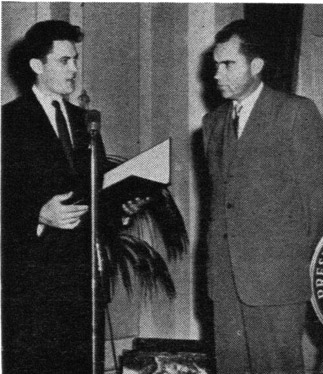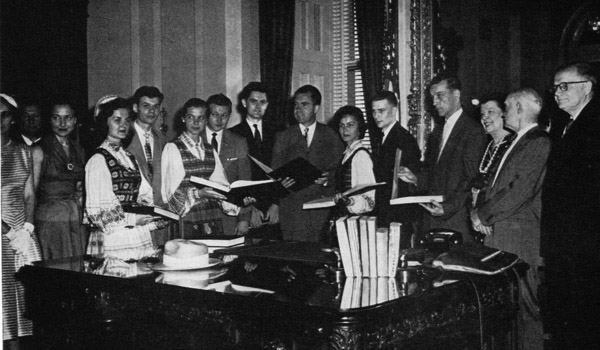
Editor in Chief: L. Sabaliūnas
 |
www.lituanus.org |
|
Copyright
© 1956 Lithuanian
Students Association, Inc.
October
1956 No.3(8)
Editor in Chief: L. Sabaliūnas |
|
An Appeal for Justice
 |
| Vice
President Richard M. Nixon receives V. Adamkavičius, Chairman of the Delegation. |
In the course of some sixteen years, Lithuania has been fighting her occupants for the restoration of her lost freedom. The struggle is a part of that world-wide, anti-communist crusade, carried on directly by the oppressed peoples who are now being counted by the hundreds of millions. During the past twenty years the whole civilized world has been searching for the answers to the problem of freedom and slavery. If freedom in the world became accessible to some people, it was refused to millions of others. From the shores of the Baltic, along the Carpathians, and to the Adriatic £ea the Red Imperialists, having broken all their honored commitments and international agreements, maintain control over millions of once-free peoples by means of armed force and brutal terror.
The Lithuanian Nation fights its battles on two different fronts: at home and abroad. The fight itself, however, is one — iust as the very idea of freedom is one and indivisible. The struggle at home is in direct opposition to the Soviet occupant. The resistance is passive as well as active. In the first case, one attempts to preserve the Lithuanian national culture; in the second, one tries to prohibit the destruction of property and the extermination of the Lithuanian people by the enemy.
A large segment of the country's
population, now in the Western World as a result of the Soviet
onslaught into Central
Europe in 1944, is carrying on the struggle through diplomatic channels
in all parts of the world. All politically and ideologically minded
people, young and old alike, are part of that struggle.
An outstanding example of the efforts of those in exile is the Petition, consisting of 38,243 signatures, which on June 14, 1956, was presented to the President of the United States, Dwight D. Eisenhower. The Petition was presented by a delegation of students on behalf of the Lithuanian American Youth organizations. It was an appeal for justice. Thrae main events were underlined in the Petition:
1.
In 1940, by means of deceit and force, the Soviet Union occupied
Lithuania.
2. On June 13—14, 1941, some
40,000 innocent people were deported from Lithuania to certain death in
Siberia.
3. Deportations from Lithuania have not
ceased. To date some 150,000 Lithuanians have been deported from their
homes to the slave labor camps in the Far East.
While, in the light of these facts, the new Soviet leaders are desperately trying to dissociate themselves from the crimes of their predecessor, Joseph Stalin, and consequently to lure the Western World by soft words, the authors of the Petition humbly ask the U. S. government not to give in to the mere verbal utterances of the Soviets but to demand that positive actions accompany their soft approach. The Petition, furthermore, asks the government of the United States "to explore all possibilities for fighting the wrongs done to Lithuania and to take all possible measures to:
1.
Restore sovereign rights and self-government to Lithuania;
2. Return as soon as possible our
deported parents, sisters, and brothers to their native country of
Lithuania."
The Petition is attributed to the Lithuanian students studying in the United States. From New York in the East and Los Angeles in the West, students participated in an effort which resulted in the receipt of about 40,000 signatures in some two and a half months. Support of one kind or another was given to the whole project by all Lithuanian political parties and diplomatic consular representatives in the United States.
The Petition was presented by the delegation to Vice President R. M. Nixon on June 14, 1956. In his brief speech to the delegates Mr. Nixon advised the leaders of the Soviet Union to show their sincerity by giving "to the captive countries an opportunity once again to be independent members of the family of nations." The "Voice of America" as well as The New York Times, Washington Herald, and other newspapers carried the story of the Petition to the American people and to the whole world in forty different languages.
In Washington the delegation was also received by Senate minority leader Wm. Knowland (R., Cal.), Congressman J. Martin (R., Mass.), Sen. P. Douglas (D„ 111.), and the Senate's Chairman on Foreign Affairs, Sen. Green (D., R. I.). The Congressional leaders were briefed on the tragic status of the Lithuanian nation and were asked to do everything within their powers to help Lithuania in her struggle for freedom.
On June 15, 1956, in a special meeting, the delegates met with Cabinet Secretary Maxwell Raab, at which time the matters enumerated in the Petition were discussed in a greater detail.
The efforts put into the Petition were not in vain, for:
1.
The U. S. Government, through Vice President Nixon, has reiterated its
present position, namely, that the liberation of the enslaved peoples
is one of the aims of U. S. foreign policy; that the United States will
strive for a just peace and for self-determination for all nations.
2. The Congressional leaders assured the
delegation that they would stand firmly behind the moves of those whose
only aim is to regain freedom — a right long recognized by
civilized people.

Lithuanian Student Delegation and
members of the American Lithuanian Council
in an audience with Vice President
Richard M. Nixon.